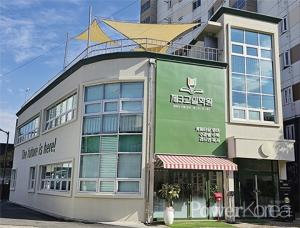 |
||
| ▲ Jeonju Daesasup Preservation Society / President Song Jae-young | ||
‘Pansori’, Korean opera, was listed in the UNESCO intangible cultural heritage in 2003. And ‘daesasup’ is a great contest between Korean opera singers. Daesasup in South Korea is normally represented by Jeonju City. First started in 1975, the contest calls great Korean opera singers from all over the nation. For many unknown singers, the contest has been the very place where they make their names known to the world.
Back in the days, ‘daesasup’ embraced horseback archery and other martial arts, and also essay writing and singing. The contest came to a halt during the colonial era for tens of years but in 1975, it was restarted in 5 events: singing, farmer’s music, dancing, poem writing and archery. After 2 years in 1977, people with one mind for the need of an organization gathered together and formed the Jeonju Daesasup Preservation Society.
With the traditional pansori in the center, the contest is now embracing even busking, foreigner’s pansori and military band music. The society organized a special contest last year to celebrate the 100th anniversary of establishing the Provisional Government of the Republic of Korea in 1919. Also, the society dispatched a cultural delegation to the 7th Coffee Expo Vietnam.
Song Jae-young
Society president Song Jae-young started pansori at 16. After graduating university, he challenged for the 29th national contest in 2003 and surprised the industry officials by winning the presidential prize in the category of master singing. He trained himself under instruction of master Korean opera singer Lee Il-ju, who is the 2nd intangible cultural asset of North Jeolla Province.
Song has served as a pansori professor at the North Jeolla Provincial Institute for Korean Traditional Performing Arts and the director of the North Jeolla Traditional Opera Company in which he has fostered young talents for the last 20 years. Currently, he is working as a visiting lecturer at Korea National University of Arts.
Taking the steering wheel of the Jeonju Daesasup Preservation Society, he has worked day and night with great passion and drew A-grade at an assessment carried out by the Ministry of Culture, Sports and Tourism. He is now received as a role model from Jeonju City and industry officials as well as fellow artists.
October 9th
Due to continuous social distancing amid COVID 19, the 46th contest and the 38th contest for students have been rescheduled to October 9th this year. The competition events will be taken place in 9 areas this year: pansori, farmer’s music, folk music, instrumental music, Korean zither and singing, dancing, poem writing, archery and pansori drumming.
“It is regretful that traditional Korean music seems to be experiencing unidentified forms of performance due to the influence of western music. I think tradition has its traditional value while new has its new value. So it is important for me to make clear of this borders” says Song.
Song also points out government’s relatively low budget allocation for artists as many of them are in financial difficulty and they are not able to demonstrate their talent and skills by 100%.
Good news, however, is that opening a daesasup hall is in process of making an ordinance by Jeonju City Council and officials are expected to see the result by the end of next year.
“It is our goal to grow Jeonju Daesasup as a global cultural contest over South Korea. When the hall is completed, we will introduce a variety of cultural programs including lectures and seminars as well as overseas tours and exchanges” says Song.
권동호 dongho2010@naver.com






